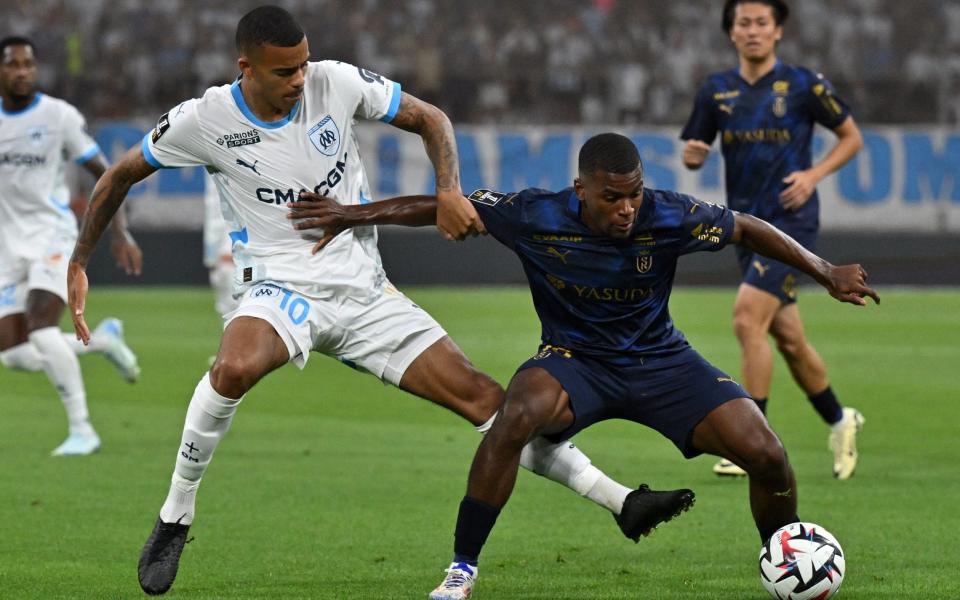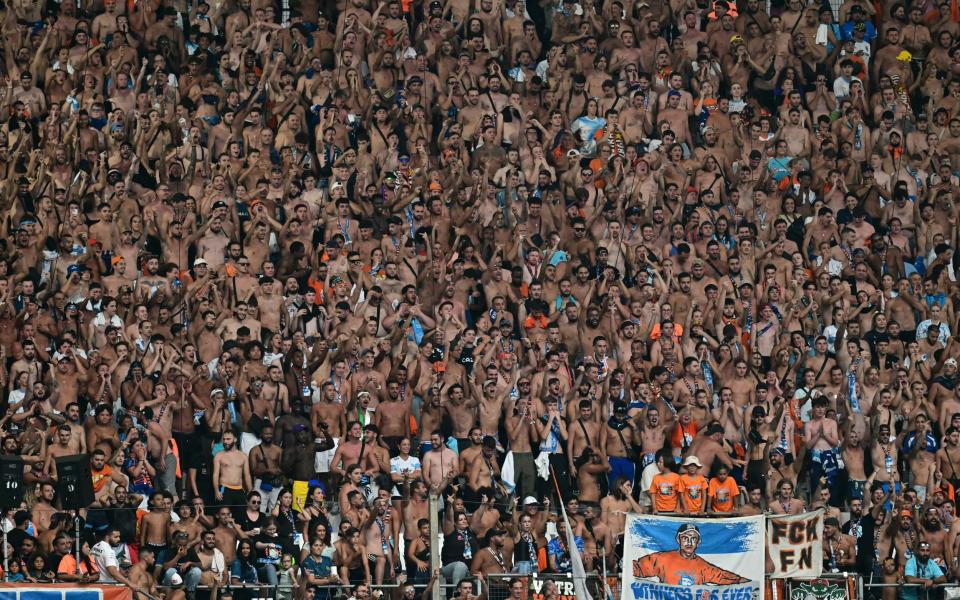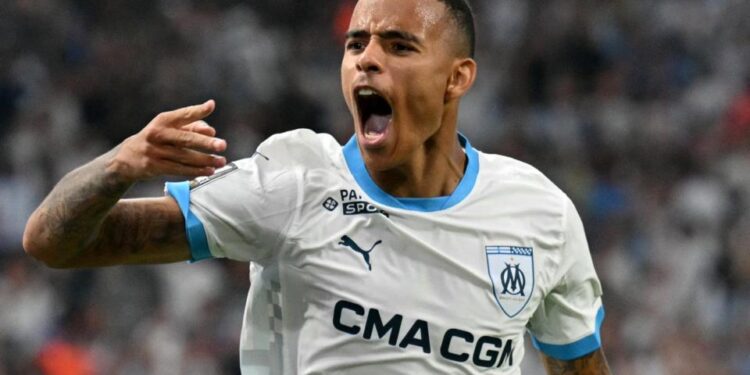
For a supposed persona non grata, this was quite the salutation. Mason Greenwood, the winger engulfed by such ugly turmoil in England that he has had to rebuild his career overseas, was given the most guttural of Marseille welcomes on this sultry Mediterranean night. In the most vivid illustration that football will airbrush anything if the price is right, the 22-year-old strode out for his home debut here not to a chorus of catcalls but to a wall of grateful noise from fans who enveloped him in a haze of orange smoke.
“Greenwood 10” was, by a distance, the most popular shirt on the teeming approaches to Stade Velodrome. Dimitri Payet, considered a club legend courtesy of the emotional attachment he inspired, used to wear this number. And against all logic, there are early signs that Greenwood could forge a similarly intense bond. In a team denuded of star quality, and in a French league prised open by Kylian Mbappe forsaking Paris St-Germain for Real Madrid, he is the lightning rod for Marseille disciples’ desperation to anoint somebody, anybody, as their saviour. Somehow, he justified their faith here, contriving the equaliser that rescued pride against Reims.
Rarely can Aux Armes, their traditional war cry, have been sung with greater ferocity. The question is whether the character of the man can ever truly be separated from the toxicity of the circus he has left behind. The ultras evidently believe it is possible: when, around half an hour before kick-off this 2-2 draw, he emerged on the pitch from behind a blue curtain, there was not a single boo to be heard. So much for the predictions that Greenwood would be the subject of mass contempt once elevated from his lower-profile loan spell at Getafe, on Madrid’s southern outskirts. Never mind opprobrium, he received only a rapturous ovation. The volume intensified to ear-splitting levels when a deflected shot from Quentin Merlin fell for him to head in at the far post.
We are 2½ years removed from the surfacing of a harrowing video that showed a man, alleged at the time to be Greenwood, abusing a woman and attempting to coerce her into sex. The woman posted graphic images of her face streaked with blood and her body covered in several bruises, suggesting that Greenwood had inflicted the injuries. Criminal charges against him were later dropped, with the Crown Prosecution Service explaining that crucial witnesses had withdrawn their co-operation from the investigation.
Click here to view this content.
The idea embraced by Marseille is that Greenwood, having no criminal conviction, should face zero impediment to being gainfully employed. Pablo Longoria, the club president, has airily dismissed any objections on ethical grounds, saying: “I respect everyone’s opinion, but I am not here to get into controversy. We are talking about the past. It is a complex and old situation.” Except neither Greenwood nor United, who conceded he had made “mistakes”, have done anything to clarify these supposed complexities.
The subject is constantly shirked: Greenwood simply refers to a press release issued a year ago, in which he acknowledged it would be too difficult for him to resume his career at Old Trafford. That is if it can be asked at all. So far, Marseille have shut down any mention of the topic. “It’s tiring,” says Elsa Labouret of French women’s rights group Osez le féminisme (Dare to Feminise). “Once again, we consider that talent is enough to turn a blind eye to these accusations.”
The PR war game around Greenwood is to bury them altogether. The more he delivers, the likelier the bleakness of his past is to be discarded here. In a 3½-minute segment on Telefoot, France’s Sunday football magazine show on TF1, the notorious video was not alluded to once, with the focus firmly on his breathless tributes to his debut performance at Brest, where he scored twice. “What scares me,” said one supporter arriving for his first home game, “is that if he’s too good we’ll only have him for one season.”
There was not the faintest sense of a fanbase mortally ashamed by the character of their summer signing. On the contrary, their euphoria suggested they had forgotten why there was any hue and cry in the first place. A record 49,000 season tickets have been sold for this campaign, such is the intrigue stirred by the arrivals of Greenwood and Roberto De Zerbi, the former Brighton manager promising to lift the ennui at a club craving a first league title since 2010.
The unpalatable but universal truth is that miscreant players will be forgiven for anything so long as they are useful to the cause. Greenwood is hardly the first in France to be granted absolution under the darkest of clouds. Take Monaco’s Wissam Ben Yedder, who was allowed to continue as his club’s highest earner last year even after being formally charged by the Nice prosecutor’s office last August with rape, attempted rape and sexual assault. He denies the charges.
It was curious, then, to hear Benoit Mayan, the mayor of Marseille, lacerate Greenwood’s move to the city so savagely. “I saw images that deeply shocked me,” he said last month. “I believe he cannot have a place on this team. The values of Marseille and of Olympique de Marseille are anything but that. Can you imagine, violence against women? It’s a disgrace.” Ultimately, all his promises to persuade Longoria to reconsider have come to nought.


As for the “values” that Mayan imputes to this club, you wonder quite what he means. Yes, Marseille took laudable action at the height of the pandemic by using their training ground as a refuge for 18 women escaping domestic violence. But any suggestions that they are too unimpeachably pure to countenance Greenwood donning their white jersey are a stretch. After all, their late benefactor Bernard Tapie became emblematic of the worst scandal in French football history. In 1995, he received an eight-month prison sentence after it was revealed he had offered a bribe to Valenciennes to underperform in a league game, all so that his players could stay fresh en route to their 1993 Champions League triumph.
Being the only French club to have grasped Europe’s most glittering prize, they dream restlessly of a return. As it stands they are starved of any continental outlet at all, having finished eighth last season, but securing Greenwood’s signature for £26.6 million at least hints at a grander ambition. The equation is straightforward: if he scores, he is adored. No sooner did De Zerbi marvel at his first goals in Brittany than he said: “That way, he will be less of a target for controversy.”
If Greenwood were pursuing any other profession in Marseille, there would be no such searing inquisition. It is the fact he can reinvent himself at the highest level of football, a sport long steeped in misogyny, that has stoked understandable outrage among women in particular. He was forced out of United due to the ferocious backlash against attempts to reintegrate him, with one group of female fans lambasting him as an emblem of “extreme arrogance, entitlement and exceptionalism”.
Vestiges of this sentiment have followed him to the south of France. “Olympique de Marseille is more than a club, it is a spirit,” declared Payan, insisting that Greenwood had forfeited any right to represent the institution. Elsewhere, there is fatalism at the ease with which he has been assimilated. “It is a demonstration of the impunity enjoyed by people accused of sexist and sexual violence,” says Carine Delahaie of Femme Solidaires. “The vast majority return to normal lives.”
Greenwood’s existence today would fit few people’s definition of normal. When he first joined Getafe, he was accompanied by United chaperones seeking to help him settle. Marseille staff, similarly, are forming a Praetorian Guard around their latest acquisition, policing his media engagements anxiously. But he is yet to look overawed by his transition to a club with such a febrile fanbase. He is understood to have formed an early friendship with Amine Harit, the Moroccan midfielder who scored the only goal against Reims. Plus, he has begun house-hunting.


In De Zerbi, he is fortunate to have a mentor pledging to treat him “as a son”. The uncertainty is what happens to him if everything slips off the rails. Marseille’s die-hards, many of them shirtless in the oppressive August heat, are a capricious bunch of the best of times. Their mood can fluctuate wildly over the course of not just one season, but a single match. These 90 minutes were in a case in point, with early jubilation at Harit’s goal giving way to mass disgruntlement once Sergio Akieme and Yaya Fofana propelled Reims into a shock lead. Suddenly, De Zerbi’s substitutions were treated with whistles of disdain.
Honeymoons can last mere minutes in this cacophonous atmosphere. It is a chaotic place for players to ply their trade, with the constant screeching from the stands mingling with frequent firework bangs from outside. Greenwood, far from shrivelling under this scrutiny, appears to be prospering. Involved in all five goals against Brest, he engineered the rescue act to thwart Reims and sustain Marseille’s most encouraging start since the years of PSG’s Qatari-bankrolled dominance began.
Unedifying as his story has been, the rancour once provoked by his very name is dissolving. Whether in reviving his club career by the azure waters of Marseille, or in preparing to switch his international allegiance from England to Jamaica, Greenwood seems to be hell-bent on a warp-speed transformation. That might be utterly distasteful given how far his stock has fallen at home. But in football, the brutal calculation is that the ends always justify the means.







